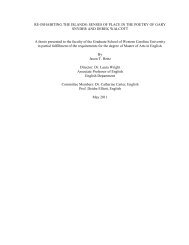SUMMERS, KAREN CRADY, Ph.D. Reading Incest - The University ...
SUMMERS, KAREN CRADY, Ph.D. Reading Incest - The University ...
SUMMERS, KAREN CRADY, Ph.D. Reading Incest - The University ...
Create successful ePaper yourself
Turn your PDF publications into a flip-book with our unique Google optimized e-Paper software.
94<br />
virtue, resists and is made whole in both mind and identity, as he is rewarded by reunion<br />
with his wife and return to his throne. But even this may be considered subversive of<br />
patriarchy because this happens through the agency of a woman; the male cannot<br />
accomplish it without her.<br />
In the play, Pericles addresses Antiochus on the moral responsibility of kings:<br />
“Kings are erth’s gods, in vice their law’s their will; / And if Jove stray, who dares say<br />
Jove doth ill?” (I.1.104-5). <strong>The</strong> power of the king, in accord with James I’s declaration, is<br />
absolute. Antiochus obeys his will in committing incest even though it is morally wrong.<br />
When Pericles discovers the sin, he must flee because there is no legal recourse to stop<br />
Antiochus. Pericles, in contrast to the tyrannical Antiochus, is the good king. In both<br />
versions, this good king gives his own grain to the starving people of Tarsus; he speaks<br />
humbly to the lowly fisherman who rescued him from the shipwreck, rewards those who<br />
help him, and takes care to see his daughter properly settled in a suitable marriage that is<br />
to her liking. Contrasting the good behavior of Pericles/Apollonius to the selfish,<br />
incestuous, perverted behavior of Antiochus allows Pericles/Apollonius to serve as a<br />
mirror for future good monarchs.<br />
As time passes in the play we see that this character is also a model father, which<br />
is crucial to being a good king. His virtue, demonstrated through his rejection of incest<br />
and of the tyranny which would have served to excuse it, is rewarded by his reunion with<br />
his daughter and his wife and his restoration to his throne. He gains a son through the<br />
marriage of Marina to the right man, signaling “a return to patriliny and normalcy”<br />
(Archibald 18), as does Apollonius in Gower’s tale. As soon as Apollonius discovers his
















